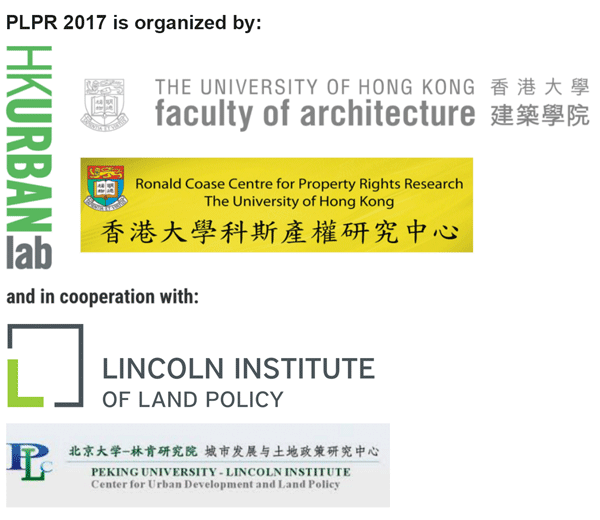Home » special session
Category Archives: special session
Special Session: Property Rights and Governance of Integrated Sustainable Under-Above Ground Developments

Session Chair: KP Cheung, The University of Hong Kong
In densely populated cities, expansion of urban areas is a thorny task especially for those constrained by their physical environments. In the past decades, substantial efforts have been put in around 30 countries such as Canada, Japan, Singapore, Korea, Germany, the US and the UK etc. to explore the creation of underground spaces and cities. Trails have been made to create underground connections, public spaces, interchanges, shopping malls and cavern developments for public utilities etc. These attempts not only pose challenges on engineering, traffic and planning considerations, but also give rise to concerns and debates of potential conflicts on property rights and governance issues. These conflicts entail identification of rights over the under-above ground structures, governance structure of managing integrated complex developments, land management system and dispute resolution mechanisms etc.
This special session welcome studies of the following topics:
- Delineation of property rights for under-above ground developments.
- Governance structures and issues of complex integrated under-above ground developments.
- Evaluations of institutional arrangements to facilitate land management, investment, public-private-participation, financing and dispute resolutions of underground cities.
- Institutional innovations for sustainable integrated under-above ground developments.
KP Cheung
Associate Professor
Department of Architecture
The University of Hong Kong
Email: kpcheuna@hku.hk
Special Session: An Emerging Agenda of Planning, Law, and Property Rights in China

Session Chair: Dr. Zhi Liu, Director, Peking University—Lincoln Institute Center for Urban Development and Land Policy, Beijing, China
The primary purpose of the proposed special session is to promote the academic debate and professional awareness on the emerging issues of planning, law and property rights (PLPR) in China. Strengthening private property rights both in urban and rural areas is one of the key actions in the current round of comprehensive policy reform. However, the Chinese planning profession is not well equipped with the knowledge of PLPR. On the other hand, the international academic community is increasingly interested in the PLPR issues in China. In this context, the session is designed to discuss the property rights issues that are emerging from the spatial planning, land use practices, and real estate development in China, to introduce relevant international experiences, and to explore the ways forward in addressing China’s property rights issues in planning, land use, and real estate development.
The Peking University—Lincoln Institute Centre for Urban Development and Land Policy (PLC), a co-sponsor of the 2017 Annual Conference of PLPR in Hong Kong, has led and supported PLPR research in China over the last two years. The proposed session is intended to share the findings of several studies conducted by scholars funded by the PLC and Lincoln Institute. The presentations will mainly cover the following topics:
- An overview of the emerging PLPR agenda in China
- Deficiencies in the Chinese planning law system
- Directions for China’s land policy reform
- Mortgage enforcement and public regulatory actions
- Small property rights housing and illegal construction
- Legal and regulatory constraints in transit-oriented development and land value capture
Dr. Zhi Liu
Director, Peking University—Lincoln Institute Center for Urban Development and Land Policy
Senior Fellow and China Program Director, Lincoln Institute of Land Policy
Leo KoGuan Building, Suite 508
Peking University, Beijing 100871, China
Tel.: +86 10 6275-6535
zliu@lincolninst.edu
Special Session: Developer obligations towards better infrastructure
Session Chairs:
Dr. Demetrio Muñoz Gielen
Dr. Prof. Erwin van der Krabben
(Radboud University Nijmegen, the Netherlands)
Dr. Prof. Rachelle Alterman
(Technion – Israel Institute of Technology)

In many developed economies public bodies are not anymore expected and/or able to pay all necessary public infrastructure in urban development (road infrastructure, parks, social facilities, affordable housing, sustainable measures, etc) and therefore increasingly pursue private financing. Fast urbanizing countries in Asia but also in the rest of the world also pursue the financial commitment of private parties. As a consequence, public land value capture instruments, and among them developer obligations, are gaining prominence among urban planning and land management instruments.
Special Session: Governance of Land Use
Governance of land use: between place and flows
Session Chair: Dr.-Ing. Christian Strauß, Berlin, Germany

Land use is influenced by a high variety of institutionalised activities. However, relevant policy fields in Europe – regional, agricultural and environmental policies, in particular – differ with regard to levels of activity, involved actors, topics, targets, instruments and governance modes. Although comprehensive planning and management instruments exist and sectoral activities have tended towards more integrative approaches over the last few years, an overall integrative system still does not exist. Therefore, there are still challenges to improve the interrelations of supra-local institutions, regional governance modes and property rights of private land owners. (more…)




